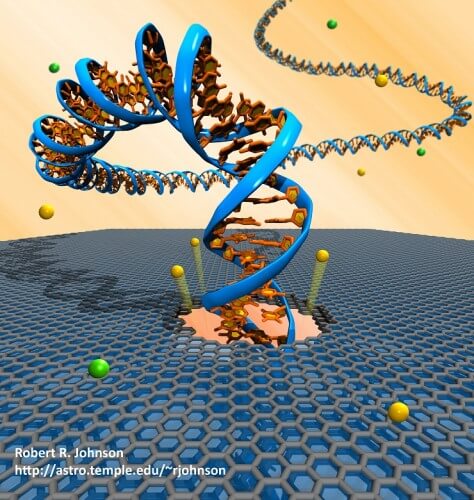This is according to the decision of the Wolf Prize Committee for 2021 in medicine. The judges' announcement stated that these scientists made breakthrough discoveries in the mechanisms that regulate RNA and demonstrated that RNA is not a passive template between DNA and protein but plays a dominant role in regulating and diversifying genetic expression
For the main news about the 2021 Wolf Awards

The 2021 Wolff Prize in Medicine is awarded to researchers: Joan Steitz, Lynn McQuatt and Adrian Kreiner, for their fundamental discoveries in RNA biology that hold the potential to improve modern and personalized medicine. These scientists made breakthrough discoveries in the mechanisms that regulate RNA and demonstrated that RNA is not a passive template between DNA and protein but plays a dominant role in regulating and diversifying genetic expression.

Joan Stitz, A professor of molecular biophysics and biochemistry at Yale University and a researcher at the Howard Hughes Medical Institute will receive the 2021 Wolf Prize in Medicine for her groundbreaking discoveries in RNA processing and function.
Our DNA carries the instructions for making all the proteins in the cell. After the gene has been copied from DNA to RNA, the RNA message undergoes "splicing" - an editing process that involves precise cutting and pasting. Steitz has studied RNA since the 1969s and was the first to describe the translation start sites of prokaryotic RNA in XNUMX. Steitz demonstrated that ribosomes use complementary base pairing to initiate mRNA translation. She turned her attention to eukaryotic cells, focusing on why eukaryotic cells produce an excess of RNA in the nucleus that is not found in the cytoplasm in the form of mRNA. Steitz also discovered that the nuclear RNA is found in small RNA particles essential for the splicing process (SNRNPs). In addition to these discoveries in research, Steitz became famous for teaching and mentoring young scientists and positioning leading women scientists in global research.
The Wolf Prize in Medicine is awarded to Joan Stitz for her major contributions to the foundations of the field of RNA biology. In particular, she discovered the critical roles of small, non-protein-coding RNAs in pre-mRNA splicing and ribosomal RNA maturation. She shed light on biochemical mechanisms that regulate RNA stability in eukaryotic cells. Her pioneering discoveries laid the foundations for much of the subsequent research in RNA splicing.
Lynn A. Makwat, A professor of biochemistry and molecular biology at the University of Rochester, whose research focuses on the cellular mechanisms of human disease, will receive the 2021 Wolf Prize in Medicine for the discovery of a mechanism responsible for the degradation of messenger RNA (mRNA) carrying mutations.
Messenger RNA (mRNA) takes genetic instructions from DNA and uses them to make proteins that perform multiple cellular functions. NMD is a quality control mechanism that removes damaged mRNA molecules that, if left intact, would lead to the production of abnormal proteins that could be toxic to cells and drive disease. Cells also use this pathway to better respond to changing environmental conditions. Her work has advanced the understanding of the molecular basis of human diseases and provides valuable information that helps doctors implement "personalized" medicine.
The Wolf Prize in Medicine is awarded to Lynn McQuatt for the discovery of the mechanism that destroys mutant messenger RNA (NMD) in cells. McQuatt studied beta-thalassemia patients and discovered that the mutation that causes the disease leads to premature termination of B-Globin mRNA translation. Makwat and her colleagues demonstrated the dependence of NMD on the position of an early termination codon in the transcription of the mRNA, a finding which led to the discovery of a new complex in biology. McQuatt also discovered that NMD acts on normal (non-mutant) transcripts and thus plays an important role in the ongoing regulation of gene expression.
Adrian Kreiner, professor of biochemistry and molecular genetics at Cold Spring Harbor Laboratories, will receive the 2021 Wolf Prize in Medicine for fundamental mechanistic discoveries about RNA splicing that underlie an innovative treatment for spinal muscular atrophy (SMA).
Kreiner's research focuses on how splicing works, how it changes in genetic diseases and cancer, and how we can repair defects in faulty splicing to treat these diseases. Kreiner and his team focused on finding a way to treat SMA - a neuromuscular disease that is the main genetic cause of death among infants. The Wolf Prize in Medicine is awarded to Adrian Kreiner for his key contributions that advanced the understanding of the molecular mechanisms and regulation of RNA splicing. He identified and isolated the first human splicing protein and demonstrated its roles in permanent and alternative splicing. Kreiner used this knowledge to study two genes - SMN1 and SMN2 - associated with spinal muscular atrophy (muscular dystrophy). Kreiner developed a sophisticated strategy to rescue the protein deficiency caused by mutations in SMN1, by directing appropriate splicing of the sister gene - SMN2. The treatment received expedited approval for human use and dramatically improved the lives of thousands of children born with muscular dystrophy.
- Prof. Leslie Lazerovitz and Meir Lahav Moitzman won the Wolf Prize in Chemistry 2021
- Wolf Prize in Physics for 2021 to Professor Giorgio Frisi, researcher of disordered systems
More of the topic in Hayadan:
